A Visit to Nadeshiko’s Hometown Around Japan Episode 6. Ange Violet Hiroshima
Hiroshima, the biggest city in the Chugoku region, is called ‘the city of delta,’ and has many rivers passing through it. Located between the Old Ota River and the Ota River Flood Bypass is Yokogawa station. There, you can see an array of purple banners flopping with the wind towards Setonaikai, the Inland Sea of Japan. Ange Violet Hiroshima has gotten enthusiastic support from people in Yokogawa and its adjacent town of Misasa, both of which are located in Nishi-ku (lit. “west ward”). This time, we set out to visit a uniform sponsor, in Nishi-ku, Hiroshima.
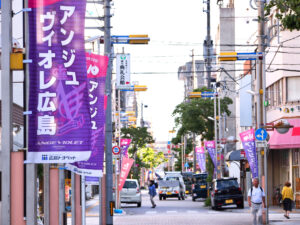
Yokogawa Hondori
10-year uniform sponsorship inspired by Ange’s serious efforts
Kazuya Takenobu, President, Shokukyo Co., Ltd.
Not far from Hiroshima station is the headquarters of Shokukyo Co., Ltd., located between the Kyobashi and the Enko Rivers. Having organized softball matches for boys, as well as matches for mothers’ volleyball, the company has been supporting Ange Violet Hiroshima as a uniform sponsor since the team’s inception. This year, it started a new 14-member project team, “Ange Cheering Party Members,” to bolster its support and encourage company-wide backing for the team.
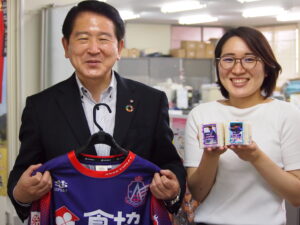
President of Shokukyo, Kazuya Takenobu (left) and Mari Shindo from Rice Business Planning Group, in Rice Division holding “Cube Rice,” the product her team developed to commemorate Ange’s opening home-games (without masks only during the photo session)
Shokukyo’s president, Kazuya Takenobu finds value in low-profile teams. “Our local baseball team, Hiroshima Toyo Carp, used to be weak. I prefer weak teams. That may sound strange, but players put in serious effort. I like that,” he said. “No matter where you are, people doing their best are attractive and worth supporting. Ange is now at a lower rank, but I think they’ll win the title one day,” he added.
Trying to draw attention to the team, Takenobu has organized a variety of collaborative events and activities. The company’s past initiatives include: “Cube Rice,” commemorating the team’s opening home-games; gift campaigns of rice; rice field art entitled “Sensation by Ange Violet”; and the harvesting of rice with players. “I want to show on TV, newspapers or elsewhere, players doing their best so people can see how charming they are,” Takenobu said. “We hope to increase the team’s involvement in our events, like factory tours aimed at nutrition for elementary kids.”
As a uniform sponsor since the beginning, what does Takenobu find so attractive about the team? “Good teamwork, above all. If you have it, overall performance will gradually improve after practicing,” he said. “Without it, you can’t expect a steady improvement, and that’s the same for companies. In business, good teamwork, as we call it “Ho-Ren-So” (meaning report, communicate, and consult) in Japan, leads to better performance,” he added. “In that sense, I think we should follow the team and expand our business.”
Developing a fit and healthy community with a huge eye-catching banner!
Yuji Toda, mayer of Nishi-ku, Hiroshima
With the second largest population among the eight wards of Hiroshima City, Nishi-ku is a traffic hub leading to Miyajima, a small island famous for the Itsukushima Shrine. With some of its workers being enthusiastic Ange fans, the Nishi Ward Office has a display area for Ange and the road cycling team, Victoire Hiroshima, on its ground floor lobby. By adding Hiroshima Dragonflies, a team in Japan’s professional men’s basketball league (B.LEAGUE), a total of three sports clubs are active in Nishi-ku. Under the slogan “Developing a fit and healthy community,” the administrative office has been providing sports-related activities for locals.
Mayor Yuji Toda, who used to play soccer, appreciates the three teams. “We often invite them to our local events and activities, so a sense of unity can be fostered in the community.”
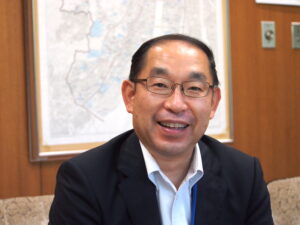
Yuji Toda, mayor of Nishi-ku, Hiroshima (without a mask during the photo session)
Every year, players from Ange Violet, Victoire, and Dragonflies join an Undokai (Sports Day) event organized by Nishi-ku, where elementary school children can form teams with players and compete. At this event, called “Waku Waku Undokai with Top Athletes,” children can observe the high-level play of top athletes, as well as their strength, speed, and techniques.
At Yokogawa Station, a busy city center in Nishi-ku, you can see a huge banner of Ange Violet hanging from the roof. It was set by the Local Vitalization Promotion Division of Nishi Ward Office, as a means to help energize their local community through sports. As shuttle buses leave from the station for Edion Stadium Hiroshima, the home of Sanfrecce Hiroshima F.C. of the J League, the banner catches the eyes of fans and supporters from outside Hiroshima. It generates questions and comments like, “What is Ange Violet Hiroshima?” or “Yokogawa is cool!”
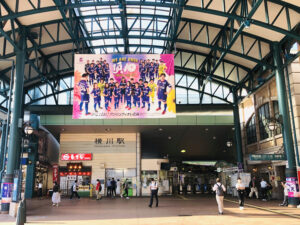
A huge banner hanging at Yokogawa Station to support Ange Violet Hiroshima
Hearing such responses to the banner, Toda said he felt reassured. “People in the town of Yokogawa support the team as one. The players also work and live as locals here, so we are happy to have ‘our home team’,” he said. “In Nishi-ku, we’re trying to include the team in our future initiatives. I hope I can play my part in vitalizing this whole area.”
Ange Violet Hiroshima celebrates its 10th anniversary in 2021. Taking steps towards the league’s summit with the residents of Nishi-ku, it has grown to become a symbol of the community.
‘Town clowns’ picking up balls for ten years
Harunobu Okita, President, Uchikoshimachi Neighborhood Association
Yokogawa is an exciting place where wall paintings can be seen on street corners. The town hosts unique events throughout the year, such as art, retro, and subculture to zombie. Ange Violet Hiroshima was born in a lively district, which calls for making ‘Kanpai!’ (Cheers!), a common phrase in the world.
“Many of us have anything-goes spirit in this town,” said Harunobu Okita, who heads the Uchikoshimachi Neighborhood Association. “At first, the team was hard to connect to, but now, they are widely known here. People recognize the team’s efforts and want to support them.”

Players Yuina Shimada and Yoshino Watariya making a guest appearance at the local event “Crazy Horror 2021”
When asked who is most enthusiastic about the team, many residents in Yokogawa would name Okita. For the past ten years, he and two other members of the ‘Ball-picking Team’ have attended the youth academy’s practice three times a week. Hosted on school grounds, at least one of them is always there to fetch the balls, and they have never missed a practice.
“In rain or snow, or even when it’s hot, we like to do it. Some call us ‘clowns,’ but we don’t mind,” Okita said. “You can’t turn back, you know. After ten years, no one talks about quitting. We still do the same things, except we message on LINE now,” he laughed.
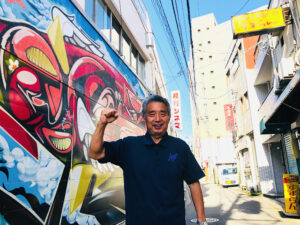
Harunobu Okita, president of Uchikoshimachi Neighborhood Association (without a mask only during the photo session)
Okita is affectionately called ‘Occhan’ (uncle) by academy members. With an umbrella in the rain, or scarf and gloves in the snow, he always appears on the grounds. “On snowy days, our feet get frozen because we hardly move. We just grumble about the cold,” he said.
His recent concern is about the aging of those who support the team. At the age of 56 he started ball-picking, and now, he is 66. “The problem is, we don’t have young people. Our generation is getting older and older, so we have to find the next ones to follow us.”
What accounts for his passionate dedication to the team? His answer was simple. “I like the team, that’s all. I like them, so I can do things for them. It’s even become my life’s work,” he said. “And, I always get energy from them!”
The dialect of Hiroshima is powerful too, so hearing his story was invigorating. It was as if a relay of power from Ange Violet to Okita reached even me.
In the district of Yokogawa and Misasa, where local buses and Okonomi-sauce originated from, a supplier for the J League, Morten Corporation, was also raised here. In this town, those who come are welcome, and you can do just about anything. Strongly backed up by locals, sponsors, and suppliers, the team is taking steps toward the next ten years, as it tries to meet their expectations.
This time, we visited Hiroshima City, the hometown of Ange Violet Hiroshima.
Text by Kazuhiro Ishii






